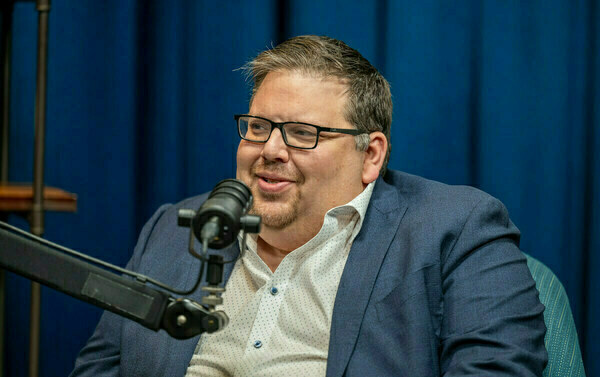Seeking evidence-based policy, economist investigates how anemia impacts education for adolescents in India

In low- and middle-income countries, anemia reduction efforts are often touted as a way to improve educational outcomes and reduce poverty. A new study, co-authored by a Notre Dame global health economics expert, evaluates the relationship between anemia and school attendance in India, debunking earlier research that could have misguided policy interventions.
Santosh Kumar, associate professor of development and global health economics at the University of Notre Dame’s Keough School of Global Affairs, is a co-author of the study, published in Communications Medicine.
The study investigated whether there was a link between anemia and school attendance in more than 250,000 adolescents ages 15 to 18. Earlier observational studies had shown a link between anemia and attendance, even after accounting for variables such as gender and household wealth, Kumar said. But he said the new study, which applied more rigorous econometric statistical analysis, did not find such a link.
Santosh Kumar’s research explores the intersection of global health and poverty reduction. His latest work evaluates the relationship between anemia and school attendance in India.

“Most previous research on this topic has used conventional study designs or focused on small geographical areas, which limits its policy relevance,” Kumar said. “Earlier estimates may have been distorted by unobserved household factors related to both anemia and school attendance. So in this study, we focused on the relationship between anemia and attendance among adolescents who were living in the same household.
“Ultimately,” Kumar said, “we found that the link between anemia and schooling is more muted than previously suggested by studies that did not consider household-level factors.”
The findings have important implications for policymakers seeking to improve education in low- and middle-income countries like India, Kumar said, which has widespread school attendance issues and struggles with health conditions such as anemia caused by iron deficiency (particularly in children and adolescents). The country has pushed to improve educational outcomes, in keeping with the United Nations’ Sustainable Development Goals, Kumar said. But to achieve that, he said, more research is needed to pinpoint an evidence-based intervention.
The latest study is part of an ongoing project to do that work. The study was co-authored with Jan-Walter De Neve (University of Heidelberg), Omar Karlsson (Lund University in Sweden), Rajesh Kumar Rai (Harvard University) and Sebastian Vollmer (University of Göttingen). The project received funding from the Alexander von Humboldt Foundation, the Swedish Research Council and the West Bengal State Department of Health and Family Welfare in India.
“Our findings have implications for policymakers who want to improve educational outcomes and reduce poverty.”
The latest study builds on an earlier one in which Kumar and fellow researchers helped evaluate the results of an iron fortification school lunch program for students ages 7 and 8 in India. That study showed that fortification reduced anemia but did not affect students’ performance in school. A forthcoming study, set to launch in summer 2024, will look at iron fortification for children ages 3 to 5. The research hypothesis is that an early-age nutritional intervention among preschoolers would make a significant impact on physical and cognitive development.
“Our findings have implications for policymakers who want to improve educational outcomes and reduce poverty,” Kumar said. “Effective policies are based on evidence. We need more rigorous statistical analysis to examine the causal relationship between anemia and education.
“This work ties into my larger research agenda, which explores the intersection of global health and poverty reduction. I want to use my academic research to support human dignity by helping to identify evidence-based health policies that will make a tangible difference in people’s lives.”
Latest Research
- Notre Dame’s Kellogg Institute partners with Vanderbilt University to launch 2025-26 democracy surveyThe University of Notre Dame’s Kellogg Institute for International Studies and Vanderbilt University’s Center for Global Democracy are partnering to advance one of the world’s leading surveys on attitudes toward democracy. Starting in October, the Center for Global Democracy, with support from the Kellogg Institute, will conduct the 2025-26 round of the AmericasBarometer, which tracks public opinion on democracy in 20 countries across the Americas.
- Cyberinfrastructure at sea: Computing, and community, on the edgeTwo members of the U.S. National Science Foundation (NSF) CI Compass learned what computing “at the edge” can look like during the spring 2025 semester. Raymond James Gallant, NSF…
- The ‘Why’ AxisJeff Rhoads, the John and Catherine Martin Family Vice President for Research at Notre Dame, resonates with the mission at the heart of the University’s work.
- Notre Dame Research accepting applications for fall internal research grantsThe application window is now open for the Research and Scholarship Program (RSP) – Regular Grant (RG). This grant program aims to support Notre Dame faculty researchers and programs that advance the University’s research enterprise, scholarly output, and creative endeavors through a competitive funding…
- Francis and Kathleen Rooney make transformative gift for Notre Dame institute focused on democracy research and educationFrancis and Kathleen Rooney of Washington, D.C., and Naples, Florida, have made a gift to the University of Notre Dame to endow an institute in the College of Arts & Letters committed to the preservation of American democracy through research, teaching and public engagement. The Rooney Democracy Institute, formerly known as the Rooney Center for the Study of American Democracy, aims to advance Notre Dame’s role as a national and global leader in democracy scholarship and as a convener of bipartisan conversations about the future of democracy.
- Shaping Innovation within the Notre Dame Ecosystem: An Alumni Spotlight with Ben Hoggan ‘15Meet Ben Hoggan, an ESTEEM alumnus from the Class of 2015. Before ESTEEM, Ben received a bachelor's degree in physics from Utah Valley University. From first hearing about ESTEEM after receiving a free application code when he took the GRE, to working at the University of Notre Dame for over seven…













